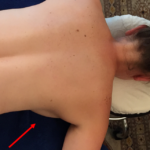An Essential Element of a Sexual Assault Prevention Program in Massage
February 14, 2025

There are many touch points in the hiring process where predator therapists can be identified. But even if an organization has a robust interview process, thorough reference checks, and criminal and predator background checks, some therapists with predatory tendencies will still inevitably slip through the hiring and vetting process. This is why it’s important to have a secret shopper program. An essential element of a sexual assault prevention program in massage is “secret shopping,” where a business hires knowledgeable and trained professionals to regularly audit massage therapists by going undercover at a spa and receiving a session.
It’s impossible to know what’s happening in the massage room without being there, but a secret shopper gives valuable eyes in the room.
The Primary Goal of a Massage Secret Shopper Program
The primary goal of a massage secret shopper program is to identify massage therapists with poor boundaries and predatory tendencies who have evaded detection through the screening process. Massage secret shopper programs are not primarily about customer service like they are for grocery stores or restaurants; they’re about ferreting out therapists with inappropriate boundaries who have difficulty following the company’s rules. Applicants are on their best behavior when being evaluated as part of the hiring process but get more relaxed and show their true colors once hired.
For the massage industry, a skilled secret shopper is an experienced massage therapist who has been thoroughly interviewed about their assertiveness and history. They make a firm commitment to the integrity of massage therapy and to identifying predatory or inappropriate behavior.
This type of secret shopper, who has been screened, vetted, and trained in the company’s safety protocols and relevant policies, can help identify high-risk individuals. They know what to look for. For example, many spas don’t permit therapists to work skin-to-skin on the buttock muscles. If a therapist violates that rule, they are likely to violate others. A secret shopper would report this behavior so that a spa could address it.
Therapist Supervision Improves Quality and Deters Predatory Behavior
Another benefit of the program is therapist supervision and improving the therapist’s work. In most work environments, observation is the most effective way to supervise an employee’s work. In the massage profession, however, being in the room to watch what they do and hear what they say is not appropriate. Employing secret shoppers lets a business know exactly what their massage therapists are doing and not doing, so they can also help them improve the quality of their work.
This type of improvement would be limited to behavior such as checking in with a client about pressure, suggesting an additional service, or performing a signature service correctly, not predatory behavior.
Another positive, though, is that the very existence of a secret shopper program acts as a deterrent to sexual predators. The entire staff is told that secret shoppers will visit them regularly, so it’s not a secret from employees. Regular secret shopper visits to a therapist team tend to curb predatory behavior.
Types of Feedback Organizations Receive from Secret Shoppers
Secret Shoppers generally provide four kinds of feedback after a visit:
- The level of customer service
- The level of skill and quality of the therapist’s work (what needs improvement)
- Lax boundaries
- Clearly inappropriate behavior.
Here is some real feedback from a Secret Shopper Program I implemented, separated into four categories:
Positive feedback on how the massage session went:
- “The therapist did a great job.”
- “The pressure was just right.”
- “The therapist addressed precisely what I asked for.”
Positive feedback is very important and builds a therapist’s confidence.
Negative feedback about what did not go very well:
- “The therapist talked throughout the massage.”
- “The therapist used way too much oil.”
- “The therapist didn’t use the appropriate pressure even when asked and did not give the session that I requested.”
Negative feedback is also quite useful for maintaining quality.
Customer service feedback about their entire experience at the facility:
- “It was easy to make an appointment.”
- “I was welcomed by the reception staff.”
- “The facility was inviting and clean.”
Danger feedback is about what made the secret shopper uncomfortable:
- “The draping did not feel secure.”
- “The therapist made an off-color joke.”
- “I did not feel safe.”
- “I felt the therapist’s pelvis pressing against my head when they were working from the head of the table.”
- “The therapist asked me to remove my underwear so that it would be easier to work on my lower back.”
- “He asked me quite personal questions, which I know is against company policy.”
- “The therapist was a little creepy.”
All of these statements and ones like them come from actual secret shoppers.
Key Takeaways
A secret shopper program fits naturally into an overall sexual assault prevention program because it does three things:
- It generally increases the quality of the services provided
- It helps identify therapists needing further training
- It helps detect individuals who need to be let go before they do something inappropriate
It is one more element that helps to screen out individuals with predatory tendencies and keeps a business and its clients as safe as possible.
If you’re a lawyer who is currently involved in a sexual assault case and needs an expert witness with a massage or spa background, schedule a conversation with Dr. Benjamin.
Ben E. Benjamin holds a Ph.D. in Sports Medicine and has been an expert witness in cases of sexual assault in a massage/spa setting since 2004, advising lawyers, testifying in depositions and trials, and writing reports. His expertise extends beyond massage therapy and ethical behavior. He also advises spas, both large and small, on the creation of comprehensive sexual assault prevention strategies that ensure safe and ethical practices in the industry.
Related Posts

Expert Witness Insight: Sexual Assault and Poor Draping in Massage Therapy
What is Draping in Massage Therapy? Draping in massage therapy means securely covering the body with a sheet, blanket, and/or towel so that the private areas of the body are covered, feel safe, and are not ever exposed. These areas include the genitals, the female breasts, and the lower buttock, where the gluteal cleft is, […]

How High is Appropriate to Massage on the Upper Inner Thigh?
How High on the Upper Inner Thigh to Massage? The upper inner thigh is one of the gateway areas where predator massage therapists begin their sexual assault. The thigh should be draped so that the pelvis and the inner thigh are securely covered. The drape is generally a sheet tucked under the thigh and […]

Expert Witness Insight: When Massage Therapists Work on the Buttocks
When massage therapists work on the buttocks, clear communication is needed so the client feels safe. This area of the body is not usually touched by anyone other than an intimate partner. Consent is Required for Work on the Buttock in Massage Work in this sensitive area necessitates a conversation with the client before […]

Expert Witness Insight: Touching the Side of the Breast When Lying Face Down
Touching the Side of the Breast When Lying Face Down I would say that more than 99% of massage therapists are ethical professionals who would never commit a sexual assault on anyone. Massage therapists who are sexual predators are usually male and frequently test and groom the clients they choose to assault sexually. For example: […]

Working On the Chest in Order to Move to the Breast
Working On the Chest in Order to Move to the Breast When working on the pectoral muscles, the drape is lowered slightly. The pectoral muscles can be massaged appropriately, working not more than one or two inches below the collarbone. The point is that therapists are trained to work on the pectoral muscles while avoiding […]
